Fundstück des Monats Jänner
Das erste Fundstück des Jahres 2024 und wir gehen 29 Jahre zurück zum Life Ball 1995! 1993 wurde der Life Ball in Wien vom Verein Aids Life (später LIFE+) ins…
Tue – Fri 10 am – 6 pm
Thu 10 am – 8 pm
The Qwien library offers around 10,000 books and other publications on LGBTIQ* topics and queer content – from all subject areas, in a wide variety of publication formats, from all genres and literary genres. There are 20 reading places available in the reading room, 6 of which are equipped with PCs for catalog and database research as well as the use of digital holdings.
The Qwien library is a reference library: the holdings can be used on site in the reading room, borrowing outside the library is not possible.
The prerequisite for use is the completion of a user form on the first visit.
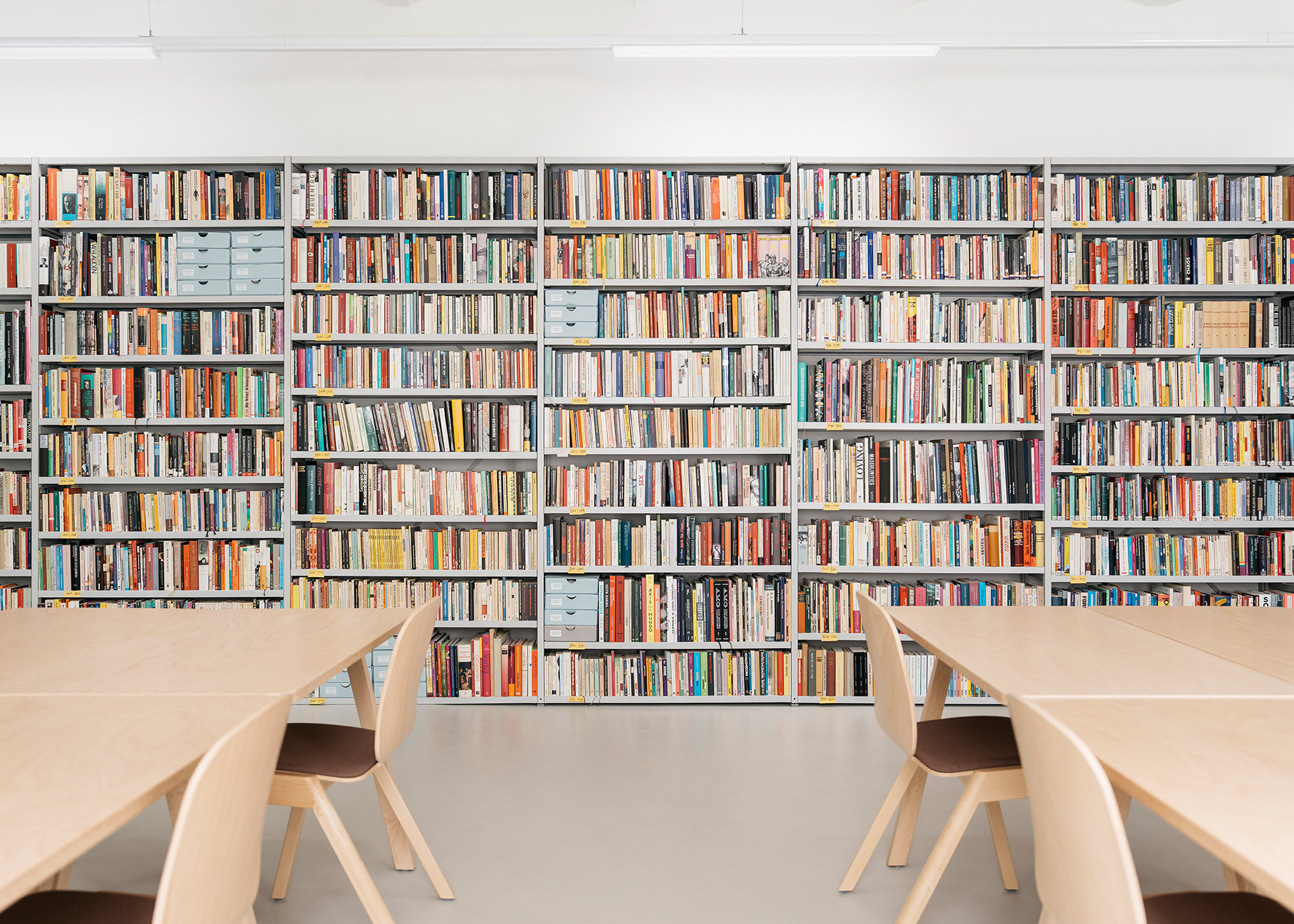 © Gregor Hofbauer
© Gregor Hofbauer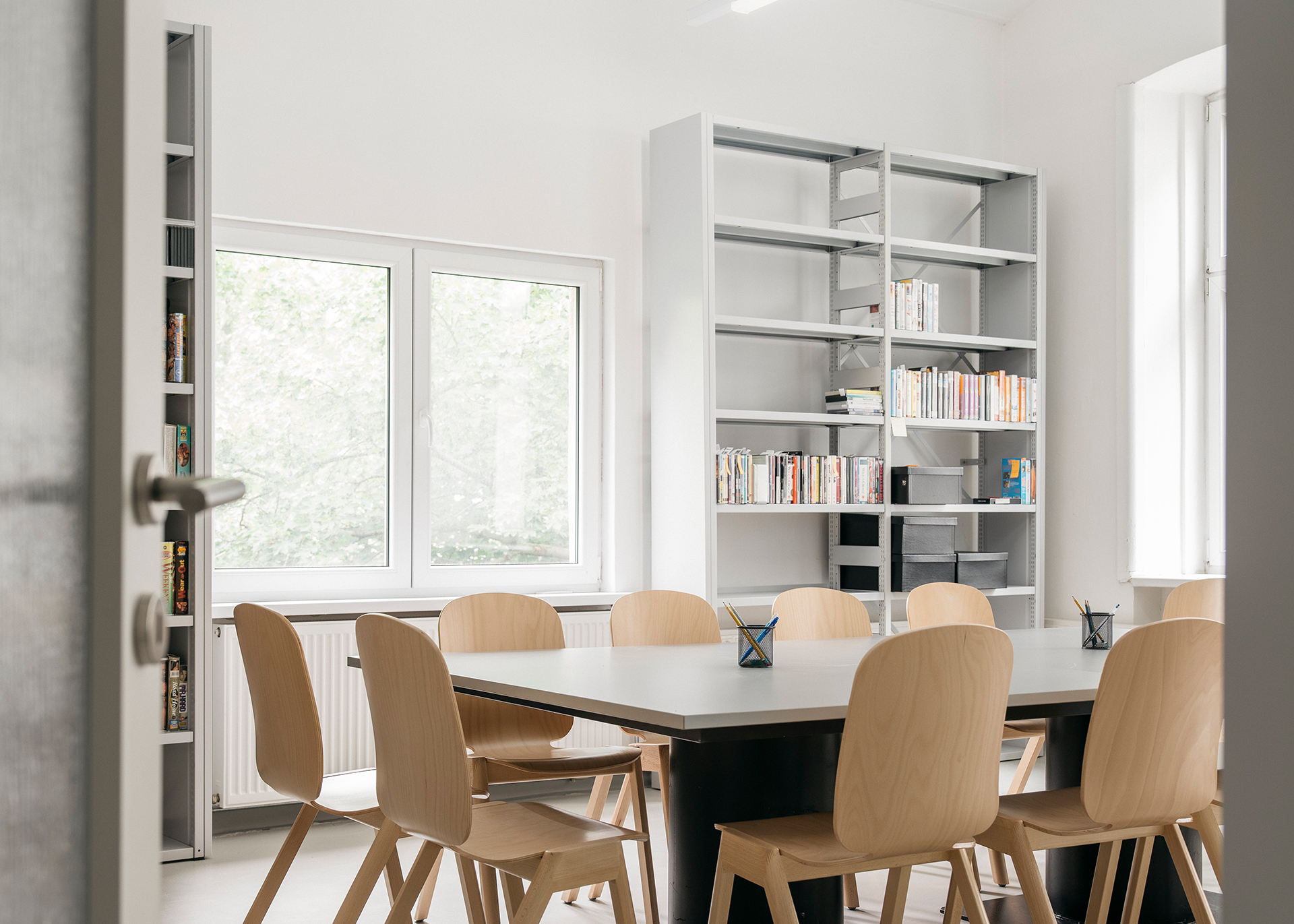 © Gregor Hofbauer
© Gregor Hofbauer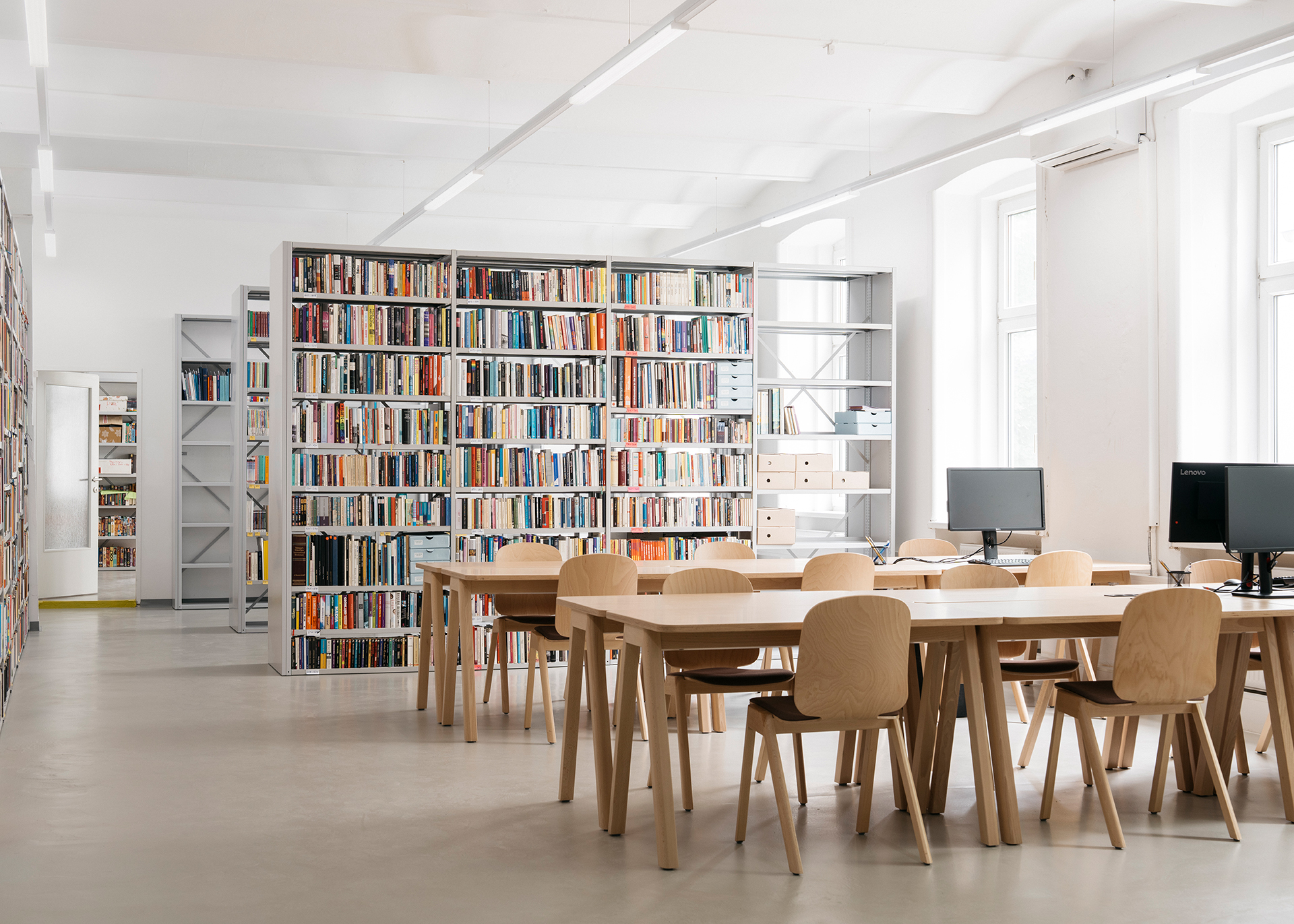 © Gregor Hofbauer
© Gregor HofbauerOne focus of the book collection is on queer history and academic research literature from various disciplines. In addition to history, these include sociology, political science, sexology, medicine, psychology, education, art history, literature, gender studies and philosophy. In addition, the library offers popular non-fiction books, experience reports or biographies as well as travel guides and guidebooks, reference works, exhibition catalogs, art books or photographic illustrated books, comics and graphic novels as well as novels, short stories or poetry. We also collect all kinds of books written by queer people, even if they are not thematically relevant.
In addition, the collection has a special focus:
Over the course of more than 15 years, a diverse collection of books has been created, which continues to grow and now includes literature in almost 40 different languages. Numerous books have come to us through donations or the acquisition of archive holdings. Qwien’s library therefore also reflects the interests and lives of numerous people and the activities of various groups and associations. Many titles are not available in other Viennese libraries, some are even unique in Austria.
We are always happy to receive book donations!
Qwien is home to the most comprehensive collection of gay, lesbian and queer magazines in Austria. It includes magazines of the gay and lesbian movement as well as lifestyle, scene and pornographic magazines – in total around 25,000 individual issues of more than 700 different magazines from around 20 countries, in 25 different languages from 1951 to the present day. The constantly growing collection has also achieved its wide range through the acquisition of the magazine archives of HOSI Vienna and Bussi magazine as well as the collection of Erich Lifka.
The journal collection is almost complete and can be searched via the library catalog.
For practical reasons, the books are arranged on the shelves according to size and consecutive number. Thematic access and literature searches are carried out via the catalog, which is accessible at the workstation PCs in the reading room or online.
The holdings can be searched online at http://katalog.qwien.at. Data records for more than 10,000 library titles and around 25,000 individual issues of the journal collection are currently available.
You can search for book titles, authors, publishers, book series or thematic keywords. The tables of contents of numerous books are also digitally recorded and can therefore also be searched. Finally, the catalog offers images of the book covers.
The online catalog makes the library’s holdings accessible through two different search options: keyword searches in search fields and browsing in alphabetical lists.
Three different search masks are available for keyword searches:
In all search fields, the asterisk functions as a placeholder that can be used at the beginning or end of the search term. This makes it possible to find all word forms or compounds that contain the search term.
It is also possible to browse through the catalog using the alphabetical lists. Such index lists are available for the titles of works, persons, publishers, keywords, languages, etc.
The above search options are also available for searching the journal collection. The shelfmarks of the journal collection always begin with the prefix “ZA”. This allows the catalog search to be restricted to the journal collection: in the simple search by entering the letter sequence “ZA” in addition to the search terms and in the search with field selection by additionally selecting the field “Signature” and entering the letter sequence “ZA” there.
The catalog already contains master records for numerous journals with information on publication history, holdings and indexing or usage. The records for all individual issues of the journal available at Qwien are also linked here. Missing master data records are constantly being added and revised.
Part of the journal collection is also available in digitized form, including all Austrian journals since the 1970s. The availability of a digital copy can be recognized by the entry “PDF file” in the field “Media type/form” of the respective data record or by the corresponding note in the master data record of the journal. For legal reasons, most digital copies can only be used at the workstation PCs on site. Where this is possible and we have permission, the digital copies can also be accessed directly via the online catalog. The tables of contents for parts of the journal collection have also been digitized and are therefore accessible via the catalog search.
We are constantly working to expand and improve our catalog. New titles are added on an ongoing basis, while existing data records are revised and completed. If anyone notices any incorrect or missing information, please let us know.
The online publication of the catalog was made possible by a special grant from the City of Vienna’s Department of Culture (MA 7), Division for the Promotion of Science and Research.
The continuation of the collection and the digitization of parts of the periodicals collection were made possible by a grant from the Federal Ministry of Arts, Culture, the Civil Service and Sport.
Info is coming.
The Qwien archive collects and preserves testimonies, documents and relics from the queer history of Vienna and Austria. It documents the life and culture of lesbians, gays, bisexuals, transgender, intersex and queer people as well as the history of their emancipation movements. As a collection and movement archive, Qwien makes a wide range of materials available for academic research.
In addition to private collections, biographical documents and complete estates of individuals, it includes archives and holdings of queer institutions, groups and associations as well as materials on exhibitions and research projects.
The archive also offers extensive collections of posters, photographs, films, audio documents, flyers, postcards, brochures, program booklets and flyers, newspaper clippings, digital sources as well as artefacts, works of art and objects.
Large parts of the archive and collections have not yet been inventoried, but some of them have been indexed. The archive and collection holdings are accessible on request and, if necessary, after checking data protection and archive law restrictions. The following overview provides a selection of the holdings, the further indexing of which is ongoing.
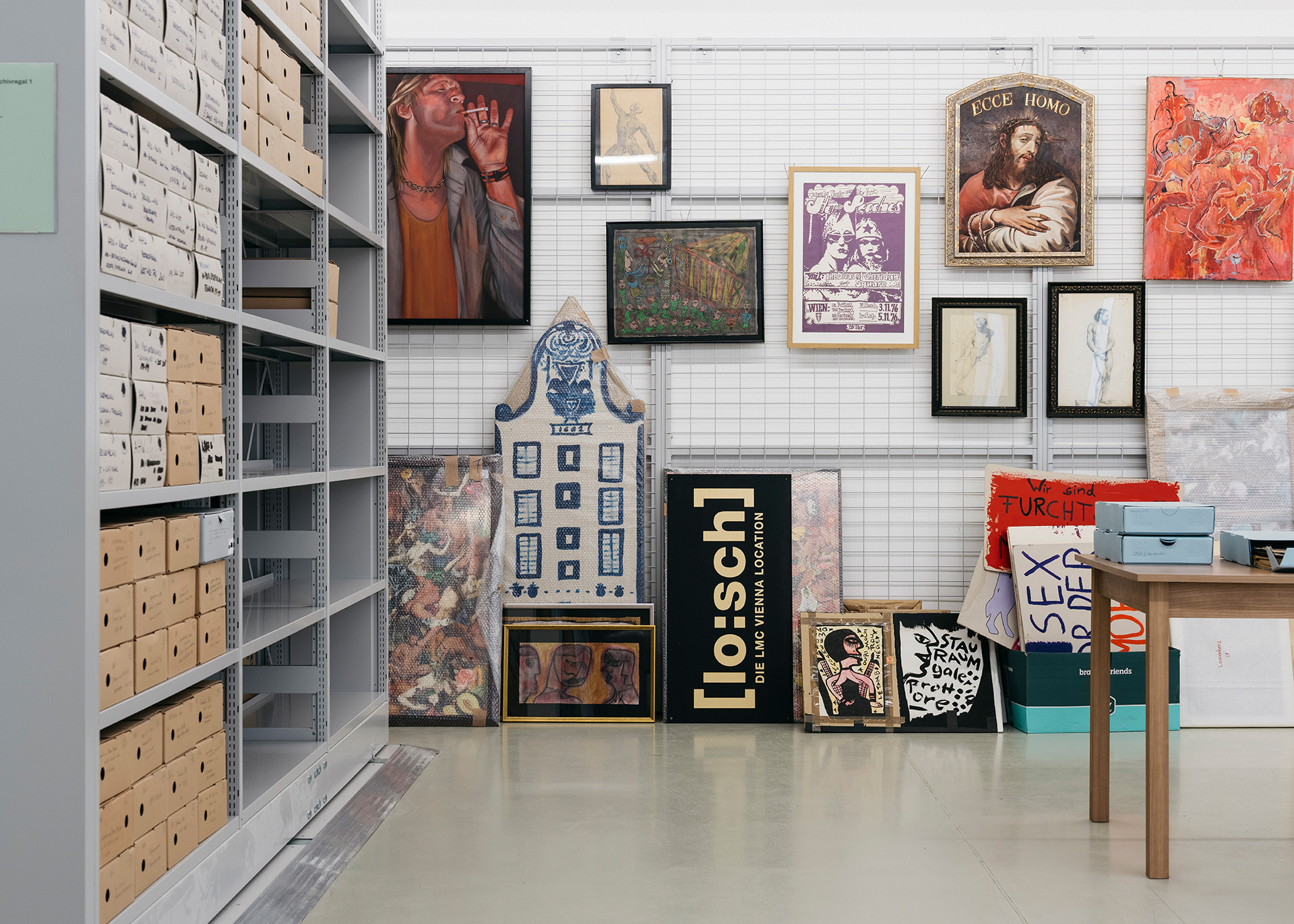 © Gregor Hofbauer
© Gregor Hofbauer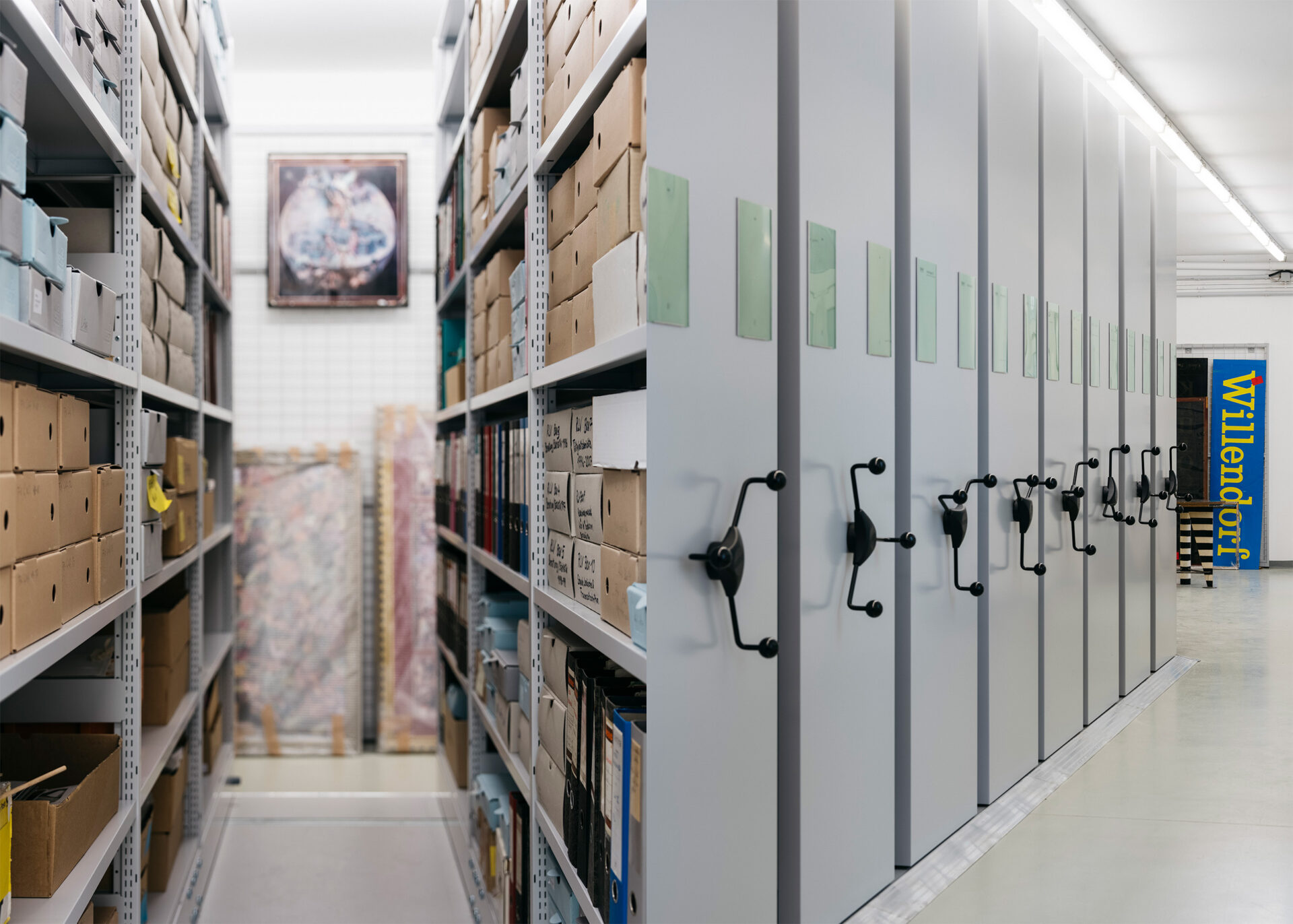 © Gregor Hofbauer
© Gregor Hofbauer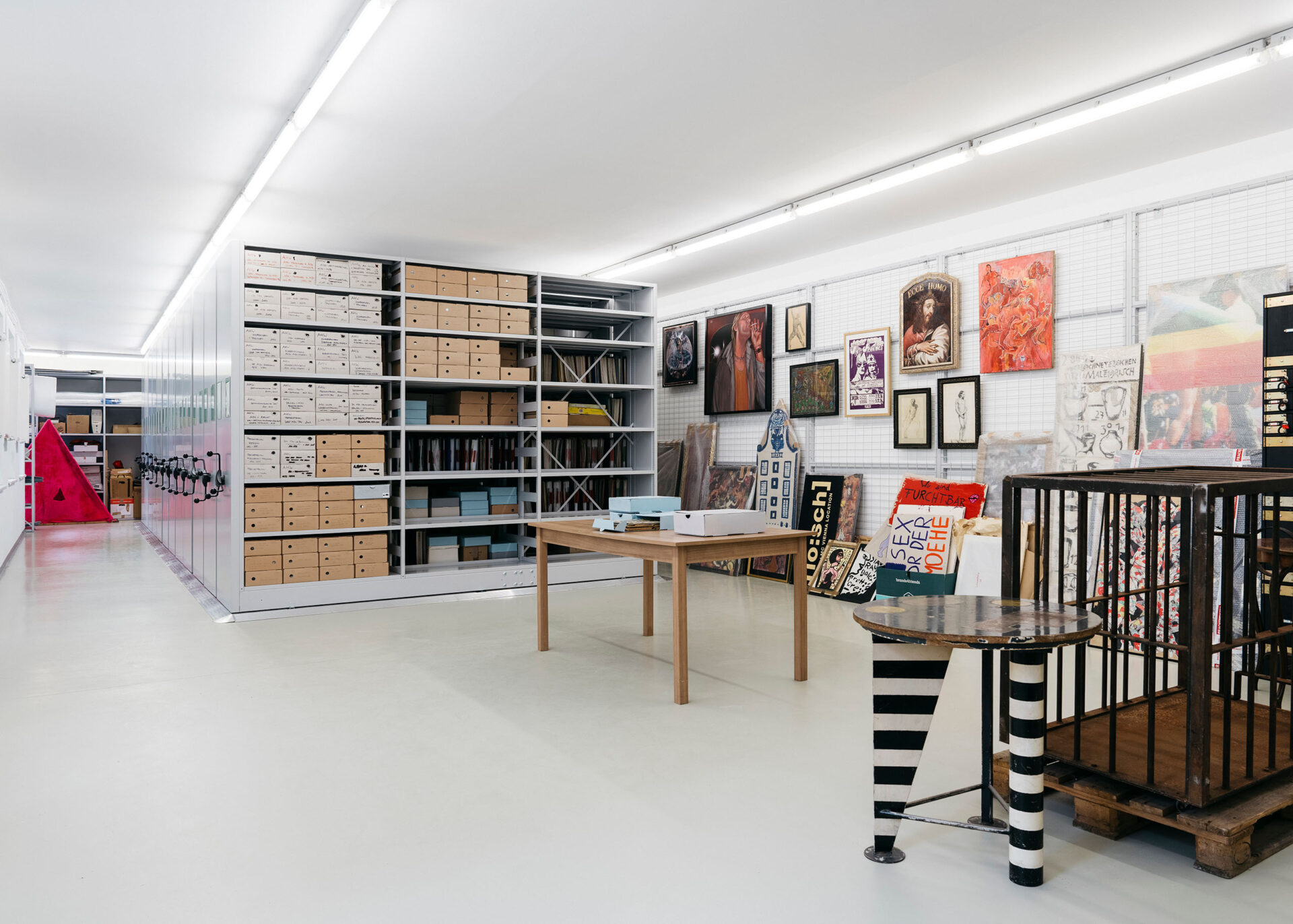 © Gregor Hofbauer
© Gregor HofbauerParts of the historical archive of AIDS-Hilfe Wien are kept at Qwien. The collection includes materials on the history of the institution from 1985 to 2010, the development of medical discourse, prevention campaigns and events, press materials, etc.
The collection comprises around 100 archive boxes and is indexed in a provisional inventory.
The historical archive contains materials on the history of the building since 1982, the general renovation (1987/88), counselling activities, political campaigns, cultural work and cooperation with other organizations of the LGBTIQ* community.
Size: more than 50 archive boxes.
The collection is partially indexed but only accessible after a data protection check.
Materials on the founding history of the Löwenherz bookshop, which opened in 1993, and on the cultural program of the affiliated Berggasse cultural association;
6 archive boxes, indexed with a finding aid.
Materials on the club’s history since 1985, international contacts (EMCM, European Confederation of Motorcycle Clubs), HIV/AIDS prevention work, event programs (“Vienna in Black”).
The collection comprises 6 archive boxes and is indexed in a finding aid.
Ecce Homo is the predecessor association of Qwien, which organized the queer cultural festival “Wien ist andersrum” (1996-2004) and the exhibition “Geheimsache:Leben” (2005).
Scope: 20 archive boxes, indexed by an inventory.
Size: 6 small archive boxes.
Austria’s only literary agency that also represented queer authors.
Scope: approx. 30 folders, not yet indexed.
approx. 5 boxes, indexed by an inventory.
Materials of the self-help association founded in 1991 to support people with HIV/AIDS;
Scope: approx. 20 folders, not yet indexed.
Partial estate of the writer, SM activist and entertainer Hermes Phettberg (Josef Fenz, 1952-2024) with materials on the “Gestionsprotokollen”, correspondence, testimonies and objects;
Scope: 40 archive boxes, partially indexed.
Collection of the politician Ulrike Lunacek (born 1957) with biographical documents, material on queer political projects and her sporting activities, including a collection of medals;
5 archive boxes, partially indexed by an inventory.
Documents and private papers of the lawyer, activist and pioneer of the homosexual movement Franz-Xaver Gugg (1921-2003), after whom the HOSI Vienna clubhouse is named; 11 archive boxes, partially indexed.
Partial estate of the writer and activist Erich Lifka (1924-2007). The collection includes around 70 of his “reading diaries” from the 1930s to around the year 2000, typescripts of his stories and translations for journals and magazines such as Amigo, Der Kreis, Der Weg, Him and Coq, as well as private documents;
40 small archive boxes, indexed by inventory lists.
Estate of the activist and artist Wolfgang Reder (1946-2017) with personal documents, collections and collages. More than 70 folders plus hard disk, not yet indexed.
Collection of the television presenter, actor and activist Günter Tolar (born 1939) with personal documents, correspondence or materials relating to his work for the “Positiv Leben” association; 2 archive boxes, indexed by an inventory.
The collection of the Polish-Austrian activist Andrzej Selerowicz (born 1948) contains materials on his activities in Eastern Europe (Eastern European Information Pool, EEIP Report 1982-1986). The collection of HOSI activist and ILGA General Secretary John Clark contains documents on the history of the ILGA in the 1990s. The documents on their participation in dance tournaments and on queer Jewish life in Vienna are shared. 3 archive boxes, partially indexed by an inventory.
Qwien’s poster collection comprises more than 1,000 posters from the 1970s onwards, including posters for events, AIDS prevention campaigns, film and theater, posters for the Rainbow Parade and the Rainbow Ball, posters for organizations such as AIDS-Hilfe, Türkis Rosa Lila Villa, LMC Vienna and many more.
The photo archive includes private photo collections such as those of Johann Graf (activist of the association “Wiener Runde” – Bärenclub) or professional photographers such as Anthony Gayton, the E. J. collection, photos from numerous rainbow parades and events of community groups, photos from the collection of the Türkis Rosa Lila Villa and HOSI Vienna. The photo collection is only partially indexed and only accessible by appointment or after clarification of copyrights.
The extensive collection of VHS cassettes and DVDs, tape cassettes, records and CDs has only been partially indexed to date. Around 700 videos from private collections (including numerous home video recordings of television programmes) have been digitized as working copies. A large number of feature and documentary films, TV series and pornographic films are available for research purposes on VHS or DVD, music recordings and other sound documents on CD, vinyl or tape cassette.
A comprehensive and constantly expanding collection of 64 boxes of newspaper cuttings from the 1970s to the present day has so far only been arranged chronologically by year, but not thematically. The collection also includes a collection of APA press releases and newspaper clippings by HOSI activist Kurt Krickler (11 boxes), a collection of newspaper clippings on lesbian issues by HOSI activist Waltraud Riegler (18 folders) and a collection of newspaper clippings by political scientist and HOSI activist Gudrun Hauer.
Founded in 1926, the Austrian League for Human Rights (ÖLfM) is the oldest human rights organization in Austria. After its dissolution in 1938, it was re-founded in 1945 and has since been dedicated to a variety of human rights policy issues and initiatives.
As early as the 1930s and again from the late 1940s, the ÖLfM also advocated the decriminalization and removal of taboos surrounding homosexuality. Its extensive archive (around 280 boxes) documents this commitment as well as all other areas of activity of the ÖLfM, making it a first-class source on Austrian legal, political, social and educational history after 1945. In 2017, the ÖLfM handed over its archive to Qwien on permanent loan. Here it was archivally processed, indexed in a separate database and made accessible for academic research. For reasons of data protection and archival law, the archive database is only accessible on site after prior registration and declaration of specific research interest.
The Qwien collection also includes a wide variety of objects relating to queer history. These include works of art (graphics, paintings, photographs, sculptures), pins, buttons and badges, furnishings, local signs, T-shirts, banners and demo posters, costumes, memorabilia and artifacts of queer life and activism.
Das erste Fundstück des Jahres 2024 und wir gehen 29 Jahre zurück zum Life Ball 1995! 1993 wurde der Life Ball in Wien vom Verein Aids Life (später LIFE+) ins…
Das Fundstück des Monats Februar ist ein Plakat der Österreichischen AIDS Hilfe aus dem Jahr 1988. Es ist eines von sechs Motiven der allerersten von Peter Baumann fotografierten Präventionskampagne der Österreichischen Aidshilfe…
2001 fand die Europride in Wien statt. Fünf Jahre nach der ersten Wiener Regenbogen-Parade und der Gründung vom WIEN IST ANDERSRUM Festival stand im CD-Booklet zum Soundtrack: "Europride steht für…
Das Fundstück des Monats April ist ein Demoschild aus dem Bestand der Türkis Rosa Lila Villa. Auf einem lila Hintergrund steht in blauer SchriftNO BORDERSNO NATIONSQUEER MASTURBATION Wir wissen nicht,…
Im Rahmen ihrer Art Roasts Series hat die finnische Kaffeerösterei Robert Paulig Roastery in Zusammenarbeit mit der Tom of Finland Foundation 2016 einen Tom of Finland Coffee herausgebracht. Und eines…
Vor siebzig Jahren erschien die abgebildete Nummer der in Hamburg erscheinenden Zeitschrift Der Weg. Die Monatsschrift für Freundschaft und Toleranz war eine der langlebigsten deutschsprachigen Homosexuellen-Zeitschriften der Nachkriegszeit. Nur der…
Diesen Monat kommt das Fundstück aus unserer breit aufgestellten Zeitschriftensammlung. Es ist die Zeitschrift Ventana Gay, die Anfang der 1980er Jahre als erste größere fortlaufende Homosexuellen-Zeitschrift in Kolumbien erschienen ist.…
Siegfried Anton Felder im Park von Schloss Schönbrunn, ca. 1987. Foto: Rudolf Katzer Siegfried Anton Felder wohnte seit der Besetzung in der Rosa Lila Villa, nach ihrer Renovierung gestaltete er…
Das Fundstück des Monats Juni ist eine Collage aus Akt-Zeichnungen von Wolfgang Reder. In unserem Archiv dürfen wir zahlreiche Kunstwerke und sorgfältig kuratierte Ordner aus dem Nachlass des Wiener Architekten, Künstlers und…
Library/Archive: Tuesday to Friday, 10:00 a.m. to 6:00 p.m.
Exhibitions: Thursday, 1:00 p.m. to 8:00 p.m., Friday to Sunday, 1:00 p.m. to 6:00 p.m.
Qwien will be closed from December 24, 2025, to January 1, 2026.
We look forward to welcoming you back on January 2, 2026. 🩷